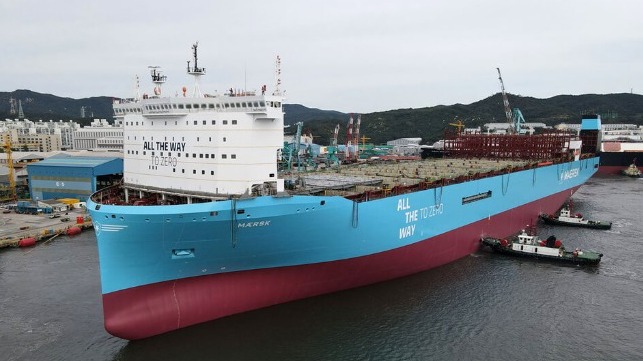Maersk Sets Launch of Methanol-Fueled Boxships and COSCO Orders Conversions

The era of methanol-fueled containerships is quickly approaching after the efforts to build the supply chain and infrastructure to support the new ships. Maersk announced the details of its initial long-haul liner service using the first of its methanol-fueled ships as it also prepares to test engine conversions for older ships. At the same time, China’s COSCO Line and MAN agreed to the next engine conversion program for methanol containerships, following similar efforts planned by Seaspan for Hapag-Lloyd.
Six months after introducing its first methanol-fueled containership, Laura Maersk, and with just 30 methanol-fueled ships, mostly tankers, in service worldwide, Maersk revealed details for its next phase of transition to the alternative fuel for its fleet. The carrier seeks to make tangible progress by 2030 on its transition to clean fuels and reach net-zero greenhouse gas emissions by 2040.
Maersk reports that the first of its 18 large methanol-enabled vessels will enter service on February 9, 2024, on one of its primary routes between Asia and Europe. The vessel, which will be named in January at the Hyundai Heavy Industries shipyard in South Korea, will be sailing between China, Malaysia, Sri Lanka, Morocco, the UK, Germany, Belgium, France, Saudi Arabia, and the UAE. Two more of the 16,000 TEU vessels will be deployed in the first half of 2024 and four additional ships in the second half of the year. Maersk has a total of 24 dual-fuel methanol-enabled containerships on order, 12 with a 16,00 TEU capacity, six with 17,000 TEU, and six with 9,000 TEU.
They are reporting having secured sufficient green methanol supplies for the first vessel’s maiden voyage and continue to work on 2024-2025 sourcing of green methanol. The vessels are also able to operate on biodiesel and conventional bunker fuel.
As Maersk is preparing for the launch of the first newbuilds, work is also progressing on the planned pilot program to convert an existing containership to dual-fuel methanol-enabled operations. Maersk and MAN announced the conversion plan in June and in October signed the contract with China’s Zhoushan Xinya Shipbuilding Company. The Maersk Halifax (15,000 TEU) will be converted by mid-2024. It has now been announced that Alfa Laval will provide the fuel system.
“Retrofitting solutions to accommodate new fuel thereby enabling the engine to operate on methanol is a complex task,” said Ole Graa Jakobsen, head of Fleet Technology for A.P. Moller-Maersk. They highlighted the space challenges for the project which involves adding a new fuel line for methanol alongside the traditional fuel line. They will be installing an FCM Methanol low-flashpoint fuel supply system to the vessel.
MAN reports that Maersk has contracted for up to 11 retrofits of vessels in the same class that use its G95 main engines. Maersk has said depending on the success of the pilot it would schedule additional projects timed to the vessel’s special surveys. The class was built between 2017 and 2019 in South Korea by Hyundai Heavy Industries.
COSCO Heavy Industry Shanghai reports that it will also be undertaking the conversion of four main engines for COSCO Line’s Camellia (13,800 TEU) and Virgo (20,000 TEU) class vessels in another project with MAN Energy Solutions. The first vessel is scheduled for refit in the second quarter of 2025 taking the current single-fuel MAN B&W 11S90ME-C10.5 engines to dual-fuel units capable of operating on fuel oil or methanol. COSCO also has an option to retrofit nine additional vessels from the line’s 20,000 TEU Virgo and Pisces classes.
Previously, Seaspan contracted with MAN in July 2023 for the conversion of containerships currently powered by MAN B&W S90-type fuel-oil-powered engines to become dual-fuel engines capable of running on green methanol. MAN reported the agreement calls for the delivery of 15 engine retrofits for Seaspan vessels operating under long-term charters to Hapag. The agreement includes a further 45 optional engine retrofits.

that matters most
Get the latest maritime news delivered to your inbox daily.
Beyond the container shipping segment, Stena also contracted with Wärtsilä for a project to convert some of the line’s ferries to methanol-capable vessels. Norwegian Cruise Line is also working with MAN to build new methanol-ready cruise ships with Fincantieri and explore the steps required to retrofit its current cruise ships for methanol.
By 2028, DNV projects 205 methanol-fueled vessels of all types now on order will be delivered into the commercial shipping fleet. They estimate nearly 250 methanol-fueled ships will be in service within five years, making methanol the second most popular fuel source being ordered behind LNG.
